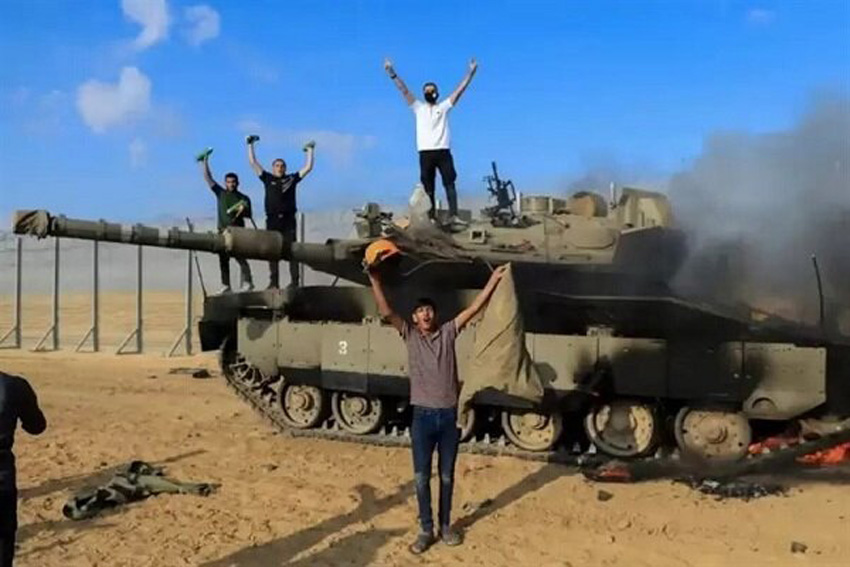
AFTER a night of airstrikes, the Israeli military has initiated a ground operation into the northern section of the Nuseirat camp, described by an Israeli army associated broadcaster as a ‘limited operation’.
Despite announcing its withdrawal from southern Khan Younis, the military maintained a brigade in the area separating northern Gaza from the south, facilitating a swift troop deployment to Nuseirat. Concurrently, attack drones caused panic as they flew low over southern Rafah city, hinting at a possible expansion of military activities.
In a harrowing incident amid these tensions, a UNICEF aid convoy was struck by Israeli gunfire, while attempting to deliver supplies to northern Gaza.
UNICEF spokesperson Tess Ingram, whose convoy was at a holding point awaiting checkpoint clearance, recounted, ‘We were waiting there when gunfire broke out in the vicinity. The gunfire came from the direction of the checkpoint towards civilians who then ran away from the checkpoint and the gunfire hit us.’ Ingram highlighted the severity of the attack, noting that ‘three rounds hit the car where she was sitting’, making it one of the gravest incidents UNICEF staff have encountered since the conflict began.
Despite the convoy being authorised and known to the Israeli authorities, the vehicles were forced to return to Rafah without delivering the vital supplies.
The political situation remains fraught as the killing of Hamas political chief Ismail Haniyeh’s family members by Israeli forces complicates truce negotiations. The discussions, which aim to halt the fighting in exchange for the release of the 133 Israeli captives held in Gaza, have shown little progress.
Hamas demands an end to the Israeli offensive and the withdrawal of Israeli forces, alongside the return of displaced Palestinians to their homes. Meanwhile, Israel has stated it will not cease its military actions until Hamas is defeated, with further plans to assault Rafah, where approximately 1.5 million civilians have sought refuge.
The Kremlin has called for restraint among Middle Eastern countries to prevent further destabilisation of the region.
Spokesman Dmitry Peskov described the Israeli attack on the Iranian consulate in Damascus as ‘a violation of all the principles of international law’, emphasising the need for stability in a region already lacking predictability.
Iran has expressed its intentions of retaliation for an April 1 air strike on its embassy compound in Damascus, which resulted in the deaths of two Iranian generals and five other Revolutionary Guard officers, thereby exacerbating regional tensions.
Meanwhile, in Lebanon, Israeli warplanes conducted raids on the eastern outskirts of Jabbain, as well as targeting Al-Dhahira town and the vicinity of Tayr Harfa village, according to local Lebanese media reports.
At the al-Awja (Nitzana) border crossing, Israeli demonstrators have disrupted the passage of trucks carrying humanitarian aid to Gaza, leading to the arrest of several protesters by border guard forces.
‘Hamas will not back down or change its position!’
THE head of the political bureau of Hamas says Israel’s assassination of his children will not make the Palestinian resistance group back down on its goals and demands in the latest round of talks aimed at reaching a truce in the Gaza war.
Ismail Haniyeh made the remarks in a phone interview with Qatar-based Al Jazeera TV network on Wednesday night, after an Israeli airstrike killed three of his sons – Hazem, Amir and Mohammad – and four grandchildren in the al-Shati refugee camp in the northern Gaza Strip.
‘Our demands are clear and specific and we will not make concessions on them. The enemy will be delusional if it thinks that targeting my sons, at the climax of the negotiations and before the movement sends its response, will push Hamas to change its position,’ he said.
The Israeli military and the regime’s so-called internal security service, Shin Bet, confirmed killing Haniyeh’s sons, who were visiting relatives on the occasion of Eid al-Fitr before their vehicle was struck.
The assassination came at a time when Hamas was preparing a response to Israel’s proposal for a Gaza ceasefire delivered through mediators during the negotiations in Cairo.
Haniyeh’s grandchildren were also killed in the airstrike that targeted a vehicle in al-Shati refugee camp in northern Gaza.
Also in his remarks, Haniyeh said killing his sons would only make Hamas ‘more steadfast in our principles and adherence to our land’.
The resistance group, he added, would ‘not surrender, and not compromise no matter how great our sacrifices are’.
The Hamas leader also noted that around 60 members of his family, including nieces and nephews, have been martyred during the Gaza onslaught.
‘All our people and all the families of Gaza have paid a heavy price in blood, and I am one of them,’ he said.
Haniyeh further decried Israel’s brutality in Gaza, saying the regime is conducting a war of ethnic cleansing and genocide on the besieged territory.
‘There is no doubt that this criminal enemy is driven by the spirit of revenge and the spirit of murder and bloodshed, and it does not observe any standards or laws,’ he stressed.
Türkiye’s President Recep Tayyip Erdogan has extended his condolences to Haniyeh over the deaths of several of his family members, the Turkish Communications Directorate said.
During the phone call on Wednesday, Erdogan said that Israel will be held accountable before the law for its crimes against humanity.
In addition, Turkish Vice President Cevdet Yilmaz condemned the attack and conveyed his condolences to Haniyeh.
‘The Israeli administration will eventually be held accountable for these inhumane attacks under international law,’ Yilmaz said on X.
Israel waged its bloody US-backed war on Gaza on October 7 after Hamas carried out its historic operation against the usurping entity in retaliation for the regime’s intensified atrocities against the Palestinian people.
So far, the occupying regime has killed at least 33,482 Palestinians, mostly women and children, and injured 76,049 others.